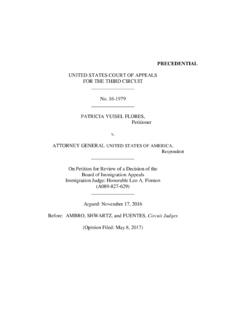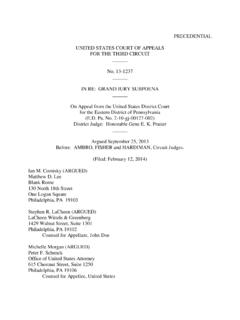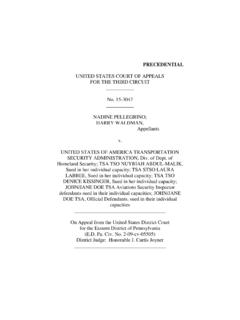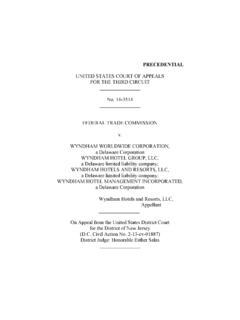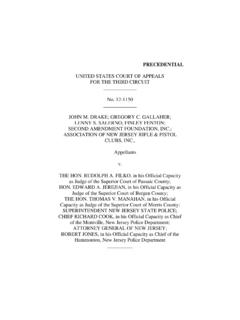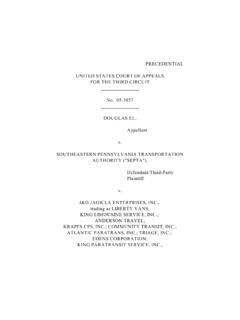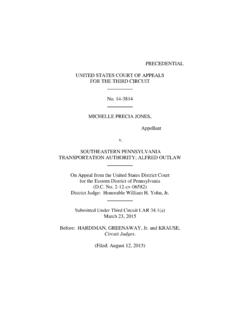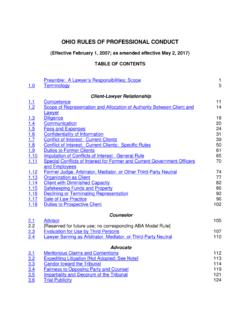Transcription of PRECEDENTIAL FOR THE THIRD CIRCUIT …
1 PRECEDENTIAL UNITED STATES COURT OF APPEALS FOR THE THIRD CIRCUIT _____ No. 17-3104 _____ BRITTAN HOLLAND, individually and on behalf of all others similarly situated; LEXINGTON NATIONAL INSURANCE CORPORATION, Appellants v. KELLY ROSEN, Pretrial Services Team Leader; MARY COLALILLO, Camden County Prosecutor; CHRISTOPHER S. PORRINO, Attorney General of New Jersey _____ Appeal from the United States District Court for the District of New Jersey ( Civil Action No. 1-17-cv-04317) District Judge: Honorable Jerome B. Simandle _____ Argued February 21, 2018 Before: AMBRO, RESTREPO, and FUENTES, CIRCUIT Judges 2 (Opinion filed: July 9, 2018) Paul D. Clement, Esquire (Argued) Robert M. Bernstein, Esquire Edmund G. LaCour, Jr., Esquire Andrew C. Lawrence, Esquire Michael F. Williams, Esquire Kirkland & Ellis 655 15th Street, Washington, DC 20005 Justin T. Quinn, Esquire Robinson Miller One Newark Center, 19th Floor Newark, NJ 07102 Counsel for Appellants Christopher S.
2 Porrino Attorney General of New Jersey Stuart M. Feinblatt, Esquire (Argued) Christopher J. Riggs, Esquire Office of Attorney General of New Jersey 25 Market Street Richard J. Hughes Justice Complex Trenton, NJ 08625 Counsel for Appellees Alexander R. Shalom, Esquire (Argued) Tess Borden, Esquire Edward Barocas, Esquire Jeanne LoCicero, Esquire 3 American Civil Liberties Union of New Jersey Foundation 89 Market Street Box 32159 Newark, NJ 07102 Alan E. Schoenfeld, Esquire Ryan M. Chabot, Esquire WilmerHale 7 World Trade Center 250 Greenwich Street New York, NY 10007 Seth P. Waxman, Esquire David M. Lehn, Esquire Tiffany R. Wright, Esquire WilmerHale 1875 Pennsylvania Avenue, Washington, DC 20006 Counsel for Amici Appellees _____ OPINION OF THE COURT _____ AMBRO, CIRCUIT Judge New Jersey s system of pretrial release has long relied on monetary bail to ensure the presence of an accused person at trial.
3 State v. Robinson, 160 1, 5 ( 2017). But in 2017, following an amendment to its Constitution, the New Jersey Criminal Justice Reform Act took effect. It replaced New Jersey s former monetary bail system with a new 4 framework that prioritizes the use of non-monetary conditions of release over monetary bail to secure a criminal defendant s pretrial liberty. Brittan Holland and Lexington National Insurance Corporation challenge this feature of the Reform Act as a violation of the Eighth Amendment, the Due Process Clause of the Fourteenth Amendment, and the Fourth Amendment of the United States Constitution. They seek a preliminary injunction enjoining Kelly Rosen, the Team Leader for Pretrial Services in the Criminal Division of the Superior Court of New Jersey, Mary E. Colalillo, the Camden County Prosecutor, and Christopher S.
4 Porrino, the Attorney General of New Jersey, and their agents (for convenience we refer to the named officials and their agents collectively as the State ), from taking any actions to enforce statutory provisions [of the Reform Act] .. that allow imposition of severe restrictions on the pre-trial liberty of presumptively innocent criminal defendants without offering the option of monetary bail. Proposed Order of Plaintiffs Granting Motion for a Temporary Restraining Order and a Preliminary Injunction at 2, Holland v. Rosen, 277 F. Supp. 3d 707 (2017) (No. 17 4317). After considering the standing of Holland and Lexington to bring suit, we conclude, as did the District Court (per Judge Simandle), that only the former may make the challenge here. On the merits, the question key to Holland s contentions is whether there is a federal constitutional right to deposit money or obtain a corporate surety bond to ensure a criminal defendant s future appearance in court as an equal alternative to non-monetary conditions of pretrial release.
5 Our answer is no. Thus we affirm the District Court s comprehensive and well-reasoned ruling. 5 I. Background A. New Jersey Pretrial Release and Detention Prior to the Criminal Justice Reform Act Prior to the Reform Act, New Jersey s system of pretrial release relied heavily on the use of monetary bail, requiring defendants to post either cash or arrange with a THIRD party a bond for their release. Robinson, 160 at 5; Att y Gen. Law Enf t Dir. 2016 6, at 9 (2016) ( AG Dir. 2016 6 ); Chief Justice Stuart Rabner et al., Report of the Joint Committee on Criminal Justice 26 (2014) ( JCCJ Report ). Some defendants were released on personal recognizance (that is, undertaking a personal obligation to appear) or unsecured appearance bond (making a personal promise to pay, and sometimes obtaining a co-signor s promise to pay, a sum of money in the event of flight).
6 See State v. Rice, 350 95, 99 ( Super. Ct. Law Div. 1975). For most, however, release on bail required the security of cash deposited with the court equal to the full amount of bail set, ten-percent cash bail, corporate surety bond, or property bond. JCCJ Report at 21 22. There was a presumption in favor of full cash bail for certain bail-restricted offenses. For most other offenses defendants were presumed to have a ten-percent cash bail option, id. at 22, which allowed them to deposit ten percent of the sum with the court and undertake a personal recognizance for the remainder. State v. Moncrieffe, 386 886, 887 ( Super. Ct. App. Div. 1978). Alternatively, defendants could post a corporate surety bond from an insurance company, which, after collecting a non-refundable fee from them and sometimes requiring collateral, executed a contract with the court and became responsible for the full amount of bail if the defendants failed to appear in court.
7 JCCJ Report at 22. A final option was to post a property bond, for which defendants or their surety pledged real property, such as a deed to a 6 house. Id. The court in setting bail was only authorized to consider the risk of flight of defendants and was not authorized to consider any danger they may have presented. AG Dir. 2016 6, at 9; JCCJ Report at 19. In 2012 two organizations the Drug Policy Alliance and Luminosity studied New Jersey s county jails and found that of those held in custody were awaiting trial, and of the total jail population had the option to post bail but were in custody due only to their inability to meet the terms of bail. Marie VanNostrand, New Jersey Jail Population Analysis 11, 13 (2013) ( VanNostrand Report ) . One in eight inmates 12% of the total population was in custody because he or she could not pay $2,500 or Id.
8 At 13. The median length of stay for pretrial detainees was 314 days. Id. at 12. The State took steps to address these inequities. Governor Christie called in 2012 for a constitutional amendment to allow for pretrial detention in serious cases. See Office of the Courts, Criminal Justice Reform: Annual Report to the Governor & Legislature 1 (2016). And in 2013 Chief Justice Rabner established the Joint Committee on Criminal Justice, comprised of judges, prosecutors, public defenders, private counsel, court administrators[,] and staff from the Legislature and [the] Governor s office. JCCJ Report at 1. In a March 2014 report the Committee examined the consequences of the State s then-current bail system and recommended a major change to its approach. Id. In practice, the State s reliance on monetary bail resulted in the release of 1 This statistic represents those defendants for whom bail was set at $250,000 or less, with the assumption they had a ten-percent cash bail option.
9 See VanNostrand Report at 13. 7 defendants who could afford to pay for their release, even if they posed a substantial risk of flight or danger to others, and the pretrial detention of poorer defendants who presented minimal risk and were accused of less serious crimes. Id. at 1 2. The report, supported by extensive research, found significant consequences to pretrial custody: defendants detained in jail while awaiting trial pled guilty more often, were convicted more often, were sentenced to prison more often, and received harsher prison sentences, than those released before trial. Id. The Committee sought to promote defendants liberty interests by shifting from a resource-based to a risk-based system of bail that relies heavily on release (with non-monetary conditions to address defendants particular risks) rather than pretrial detention.
10 Id. at 2 3. The Committee did not recommend the abolition of monetary bail, though it did expect that relying on particular, and often nuanced, conditions would result in monetary bail being set with far less frequency. Id. at 61. The Legislature ultimately adopted a proposal to amend the State Constitution as follows: All persons shall, before conviction, be eligible for pretrial release. Pretrial release may be denied to a person if the court finds that no amount of monetary bail, non-monetary conditions of pretrial release, or combination of monetary bail and non-monetary conditions would reasonably assure the person s appearance in court when required, or protect the safety of any other person or the community, or prevent the person from obstructing or attempting to obstruct the criminal justice process.

